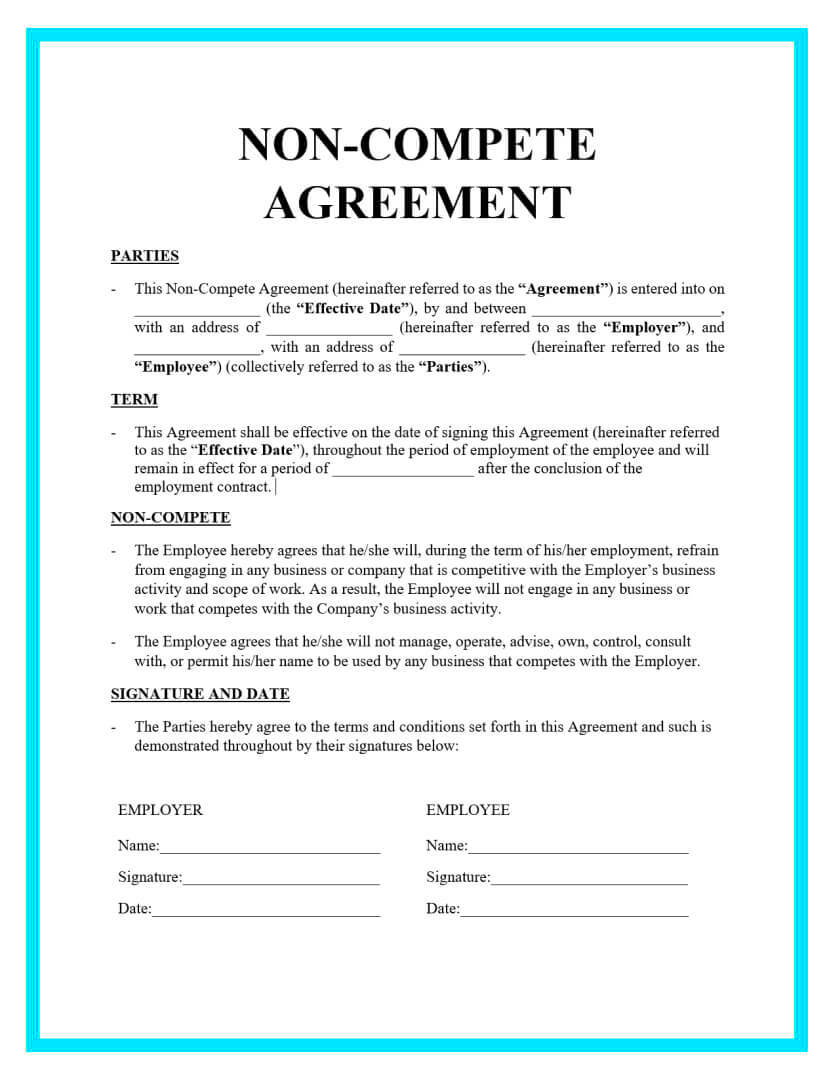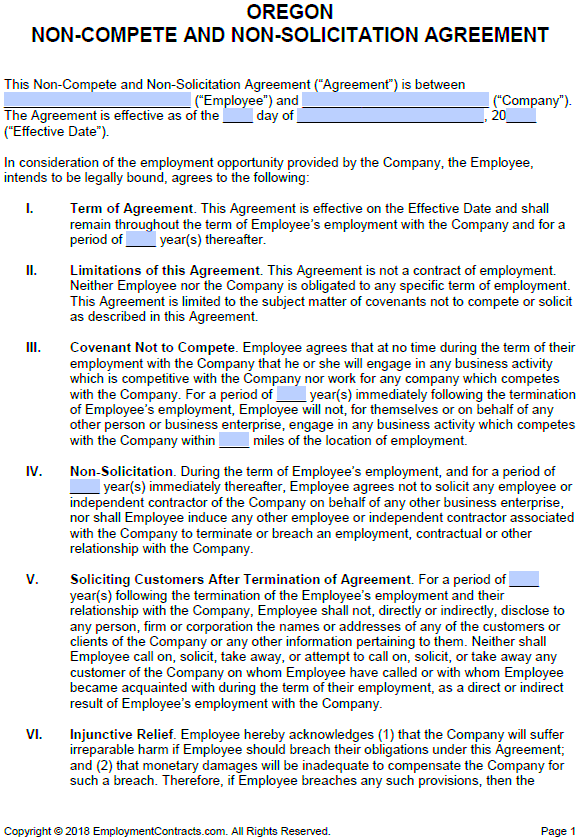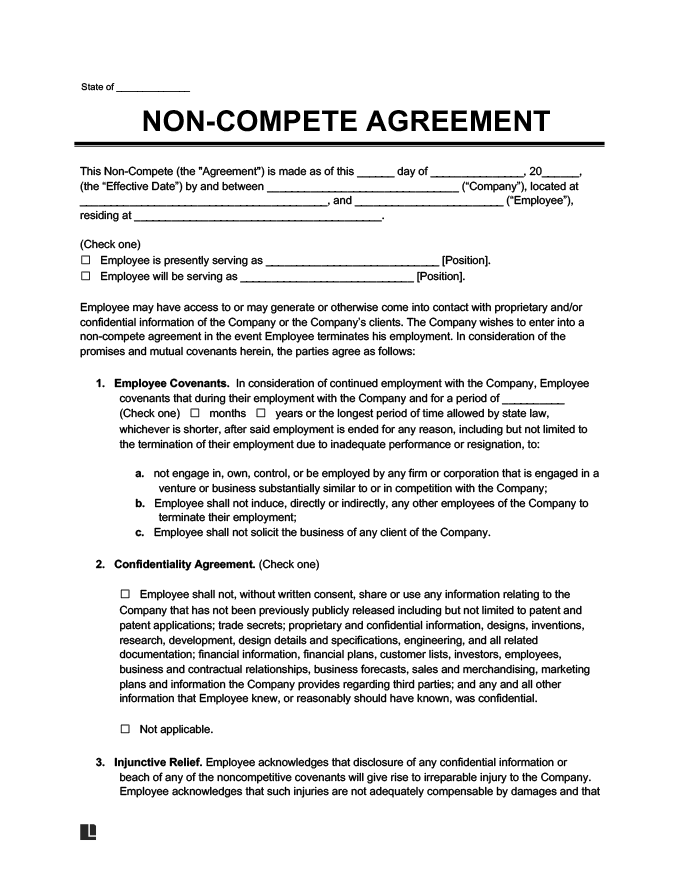Key Points of Oregon Non-Compete Agreement Laws
Oregon has unique laws governing non-compete agreements, aiming to protect employees while allowing employers to safeguard their business interests. A non-compete agreement restricts employees from working for competitors or starting similar businesses after leaving a job. These agreements can impact your career choices, so it’s essential to understand the laws surrounding them. In Oregon, these agreements must meet specific criteria to be enforceable, ensuring that employees are not unfairly restricted in their professional lives.
Key Requirements for a Valid Non-Compete Agreement in Oregon

For a non-compete agreement to be valid in Oregon, it must adhere to certain key requirements:
- Written Agreement: The agreement must be in writing and signed by both parties.
- Consideration: There must be a valid reason for the agreement, such as a job offer, promotion, or specialized training.
- Geographic Limitations: The agreement must specify the geographic area where the restrictions apply.
- Reasonable Duration: The duration of the non-compete should be reasonable, typically not exceeding 18 months.
- Protecting Legitimate Business Interests: The agreement should be designed to protect legitimate business interests, such as trade secrets or client relationships.
Understanding these requirements can help employees and employers create fair agreements that respect both parties’ rights.
Limitations on Duration and Scope

Oregon law imposes specific limitations on the duration and scope of non-compete agreements to ensure they are fair:
- Duration: Non-compete agreements cannot last longer than 18 months after employment ends. This time frame is generally considered sufficient for employers to protect their business interests without unduly restricting an employee’s ability to find new work.
- Scope: The scope of the non-compete agreement must be reasonable. This means it should clearly define the type of work the employee is restricted from doing and the geographic area where the restrictions apply. A vague or overly broad agreement may be deemed unenforceable.
- Job Function Consideration: Restrictions should relate specifically to the employee’s role. For example, a marketing manager may be restricted from working in a similar capacity, but not from a completely different role.
By understanding these limitations, employees can better navigate their rights and obligations under Oregon’s non-compete laws.
Employee Qualifications for Non-Compete Enforceability
In Oregon, not all employees are subject to non-compete agreements. Understanding who qualifies is essential for both employees and employers. Generally, for a non-compete agreement to be enforceable, the employee must meet specific qualifications. This ensures that the agreement serves its intended purpose without unfairly limiting the rights of certain workers.
Here are some key qualifications:
- Job Level: Non-compete agreements are typically enforceable for employees in managerial or executive positions. These individuals often have access to sensitive company information, making it crucial for employers to protect their interests.
- Specialized Skills: Employees with specialized skills or training may also be subject to non-compete agreements. For example, if an employee receives unique training that is not available to others in the industry, a non-compete may be more justifiable.
- Length of Employment: Employees must have been employed for a certain duration for the agreement to be enforceable. In Oregon, this often means the agreement should be signed at the time of hiring or during a significant change in employment status, like a promotion.
Understanding these qualifications can help both parties navigate non-compete agreements more effectively and avoid legal complications.
Exceptions to Oregon’s Non-Compete Laws
While Oregon has strict rules regarding non-compete agreements, there are notable exceptions to these laws that can significantly impact their enforceability. Recognizing these exceptions is essential for both employers and employees to ensure compliance and fairness.
Here are some key exceptions:
- Non-Compete Limitations for Low-Wage Workers: In Oregon, non-compete agreements cannot be enforced against employees earning less than $100,533 annually. This rule is designed to protect lower-wage workers who may struggle to find new employment if bound by restrictive agreements.
- Employment Termination: If an employee is laid off or terminated without cause, the non-compete agreement may not be enforceable. Employers need to ensure they have a legitimate reason for termination to uphold the agreement.
- Unilateral Modification: If the employer unilaterally modifies the terms of the employment contract after it has been signed, the non-compete agreement may become void. Both parties must agree to any changes for the agreement to remain valid.
These exceptions highlight the importance of understanding the nuances of Oregon’s non-compete laws. Knowing these can empower employees and encourage employers to create fair agreements.
Penalties for Employers Violating Oregon’s Non-Compete Laws
Employers in Oregon need to be aware of the potential penalties for violating non-compete laws. Understanding these penalties is crucial for both protecting your business interests and ensuring compliance with state regulations.
If an employer enforces an invalid non-compete agreement, they may face several consequences:
- Legal Action: Employees can take legal action against employers who attempt to enforce an invalid non-compete. This can lead to costly litigation and potential damages for the employer.
- Injunctive Relief: A court may issue an injunction preventing the employer from enforcing the non-compete agreement. This means the employer cannot stop the employee from working in their chosen field.
- Damages: Employers may be liable for damages if a court finds that the non-compete was improperly enforced. This can include compensatory damages for lost wages and, in some cases, punitive damages for willful violations.
By understanding these penalties, employers can better navigate the complexities of non-compete agreements and avoid legal pitfalls. It’s always wise to consult with legal professionals when drafting or enforcing these agreements to ensure compliance with Oregon’s laws.
How to Challenge an Unfair Non-Compete Agreement
Feeling trapped by a non-compete agreement can be frustrating, especially if you believe it is unfair. Fortunately, there are ways to challenge such agreements in Oregon. Knowing your rights and the steps to take can help you regain control over your career.
Here’s how you can challenge an unfair non-compete agreement:
- Review the Agreement: Start by thoroughly reviewing your non-compete agreement. Look for clauses that seem overly broad or unreasonable in scope, duration, or geographic limits. Take note of any elements that don’t comply with Oregon’s laws.
- Consult a Lawyer: Consider seeking legal advice from an attorney experienced in employment law. They can help assess the enforceability of your agreement and guide you through the challenge process.
- Gather Evidence: Collect any evidence that supports your case. This may include job offers, proof of income, or documents showing how the non-compete restricts your ability to work in your field.
- Negotiate with Your Employer: Sometimes, direct negotiation can lead to a resolution. Approach your employer to discuss the non-compete and explore potential modifications or releases.
- File a Lawsuit: If negotiations fail, you may need to consider legal action. Your attorney can help you file a lawsuit to contest the enforceability of the non-compete agreement.
Taking these steps can empower you to challenge an unfair non-compete agreement and pursue your career goals without undue restrictions.
Recent Updates and Legal Changes
Staying informed about recent updates and legal changes regarding non-compete agreements in Oregon is crucial. Laws can evolve, and understanding these changes can help both employees and employers navigate the complexities of non-compete agreements more effectively.
Some notable recent updates include:
- Increased Salary Thresholds: The threshold for exempting low-wage workers from non-compete agreements has been updated. As of 2024, employees earning less than $100,533 are not subject to non-compete restrictions, providing better protection for lower-income workers.
- Enforceability Rules: New guidelines clarify the enforceability of non-compete agreements, ensuring that employers must demonstrate a legitimate business interest to justify these agreements.
- Focus on Employee Mobility: Recent legal discussions have emphasized promoting employee mobility and the importance of fair competition, leading to more scrutiny of non-compete agreements.
Keeping up with these updates can help you make informed decisions about your rights and responsibilities regarding non-compete agreements in Oregon.
Frequently Asked Questions
If you have questions about non-compete agreements in Oregon, you’re not alone. Many people wonder about their rights and obligations when faced with such agreements. Here are some frequently asked questions that can help clarify common concerns:
- What is a non-compete agreement?A non-compete agreement is a contract that restricts an employee from working for a competitor or starting a similar business after leaving their job.
- Are non-compete agreements enforceable in Oregon?Yes, but they must meet specific requirements to be enforceable, including being in writing, having reasonable duration and geographic scope, and protecting legitimate business interests.
- Can I negotiate my non-compete agreement?Yes, it’s possible to negotiate the terms of a non-compete agreement before signing it. It’s always a good idea to review the terms with legal counsel.
- What happens if my employer violates the non-compete laws?If your employer enforces an invalid non-compete agreement, you can take legal action against them, and they may face penalties.
- Can I challenge a non-compete agreement after I’ve signed it?Yes, you can challenge an unfair non-compete agreement by reviewing its terms, consulting a lawyer, and potentially filing a lawsuit.
These FAQs can help clarify your concerns and empower you to navigate the complexities of non-compete agreements in Oregon.
Final Thoughts on Oregon Non-Compete Agreements
Navigating non-compete agreements in Oregon can be a complex endeavor for both employees and employers. These agreements serve a purpose, allowing businesses to protect their interests while balancing the rights of workers to pursue their careers freely. Understanding the key requirements, enforceability criteria, and potential challenges associated with non-compete agreements is crucial for making informed decisions.
As we’ve discussed, Oregon law emphasizes protecting employees, particularly low-wage workers, by setting clear boundaries around non-compete agreements. Employers must ensure that any agreements they create comply with legal standards to avoid penalties and litigation. On the other hand, employees should be proactive in understanding their rights and the implications of any non-compete they may be asked to sign.
In conclusion, staying informed about the nuances of non-compete agreements and the evolving legal landscape is essential for both parties. By fostering clear communication and a mutual understanding, employers and employees can navigate these agreements more effectively, ensuring a fair and competitive workplace.


